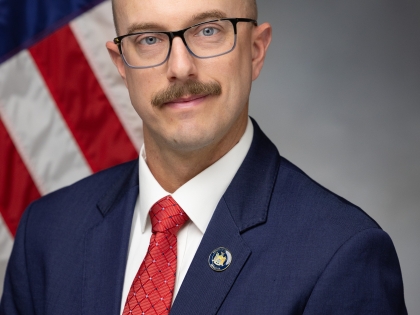
SENATOR WALCZYK OPPOSES EPR LEGISLATION THAT THREATENS NEW YORK'S FOOD SUPPLY
May 30, 2025
In a decisive stand against the reckless “Packaging Reduction and Recycling Infrastructure Act” (S. 1464/A. 1749), Senator Mark Walczyk is drawing attention to the serious risks this misguided legislation poses to New York’s food supply and existing recycling infrastructure. While the intentions behind improving recycling and reducing packaging waste are commendable, the unintended consequences could devastate New Yorkers.
S. 1464 would establish an Extended Producer Responsibility (EPR) program that imposes significant economic burdens on businesses, municipalities, and residents across New York. Senator Walczyk highlights a recent York University study indicating that the average grocery bill for a family of four could rise by $489 to $732 annually due to this legislation.
“Although reducing packaging waste is an admirable goal, the proposed legislation is fundamentally flawed and could severely impact consumers,” said Senator Walczyk. “This bill overlooks critical factors that will likely result in increased prices and reduced selections of products on our supermarket shelves—items that New Yorkers depend on daily."
The legislation includes a stringent requirement for a 30% reduction in plastic packaging within twelve years. This unrealistic goal could eliminate popular items such as Kraft single-slice cheeses, Philadelphia cream cheese, Heinz ketchup and mustard, Kraft Mac & Cheese, Capri Sun, and Maxwell House coffee from stores, leaving New Yorkers with fewer choices.
The bill’s unworkability is further compounded by its failure to incorporate expert input from food packaging professionals and the realities of current recycling infrastructures. If producers are forced to reduce packaging without viable alternatives, consumers will face limited options and higher prices, jeopardizing access to safe and nutritious food.
Moreover, Senator Walczyk addressed the potential impact on local economies, specifically referencing the Kraft-Heinz plant in Lowville, which provides hundreds of jobs. “This legislation poses a grave threat to the livelihoods of workers in our communities,” he said. “The loss of hundreds of jobs at the Lowville plant would deal a devastating blow to the local economy and the families that rely on it.”
In addition to consumer impacts, farmers are also deeply concerned about this legislation. This bill shifts the recycling burden from private companies and municipalities to producers. Farmers selling dairy, wine, cider, and other packaged goods cannot handle this responsibility, especially given the current uncertainties in the farm economy.
"By wrongly prioritizing certain materials over others, this legislation could undermine industries committed to sustainability and damage New York's agricultural sector,” Walczyk warned. “It's one-size-fits-all approach fails to account for the complexities of food safety and recycling technology. The ramifications will be dire for significant segments of the food industry and will struggle to survive under such restrictions. This legislation, crafted by bureaucrats, is just another big thick bill that does nothing more but cause confusion. Giving New Yorkers another reason to consider leaving the state; it complicates our regulatory landscape and contributes to rising prices. I understand the standpoint of environmentally responsible practices, but not at the cost of our food supply or the livelihoods of the residents of New York who are already feeling the pinch at the register.”
S. 1464 would establish an Extended Producer Responsibility (EPR) program that imposes significant economic burdens on businesses, municipalities, and residents across New York. Senator Walczyk highlights a recent York University study indicating that the average grocery bill for a family of four could rise by $489 to $732 annually due to this legislation.
“Although reducing packaging waste is an admirable goal, the proposed legislation is fundamentally flawed and could severely impact consumers,” said Senator Walczyk. “This bill overlooks critical factors that will likely result in increased prices and reduced selections of products on our supermarket shelves—items that New Yorkers depend on daily."
The legislation includes a stringent requirement for a 30% reduction in plastic packaging within twelve years. This unrealistic goal could eliminate popular items such as Kraft single-slice cheeses, Philadelphia cream cheese, Heinz ketchup and mustard, Kraft Mac & Cheese, Capri Sun, and Maxwell House coffee from stores, leaving New Yorkers with fewer choices.
The bill’s unworkability is further compounded by its failure to incorporate expert input from food packaging professionals and the realities of current recycling infrastructures. If producers are forced to reduce packaging without viable alternatives, consumers will face limited options and higher prices, jeopardizing access to safe and nutritious food.
Moreover, Senator Walczyk addressed the potential impact on local economies, specifically referencing the Kraft-Heinz plant in Lowville, which provides hundreds of jobs. “This legislation poses a grave threat to the livelihoods of workers in our communities,” he said. “The loss of hundreds of jobs at the Lowville plant would deal a devastating blow to the local economy and the families that rely on it.”
In addition to consumer impacts, farmers are also deeply concerned about this legislation. This bill shifts the recycling burden from private companies and municipalities to producers. Farmers selling dairy, wine, cider, and other packaged goods cannot handle this responsibility, especially given the current uncertainties in the farm economy.
"By wrongly prioritizing certain materials over others, this legislation could undermine industries committed to sustainability and damage New York's agricultural sector,” Walczyk warned. “It's one-size-fits-all approach fails to account for the complexities of food safety and recycling technology. The ramifications will be dire for significant segments of the food industry and will struggle to survive under such restrictions. This legislation, crafted by bureaucrats, is just another big thick bill that does nothing more but cause confusion. Giving New Yorkers another reason to consider leaving the state; it complicates our regulatory landscape and contributes to rising prices. I understand the standpoint of environmentally responsible practices, but not at the cost of our food supply or the livelihoods of the residents of New York who are already feeling the pinch at the register.”
Share this Article or Press Release
Newsroom
Go to NewsroomSTATEMENT FROM SENATOR WALCZYK
March 3, 2025
SENATOR WALCZYK STANDS WITH CORRECTION OFFICERS
February 18, 2025
Read More
Take the Questionnaire
Read More